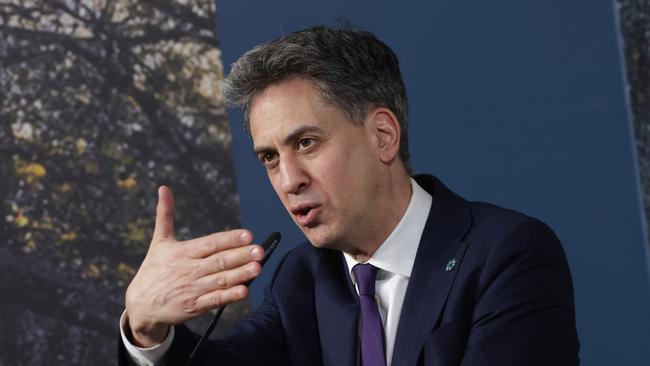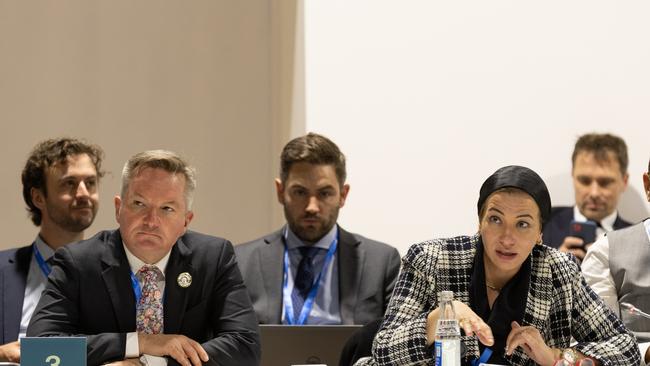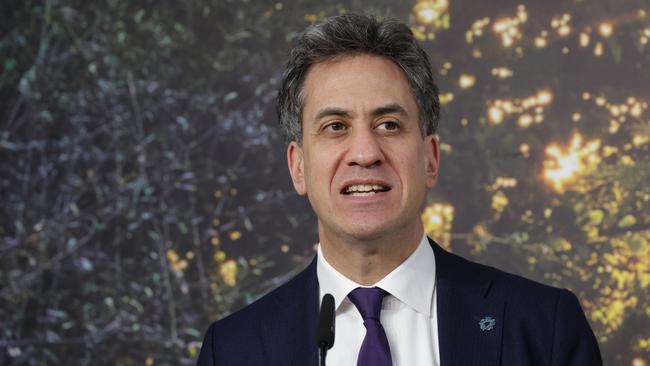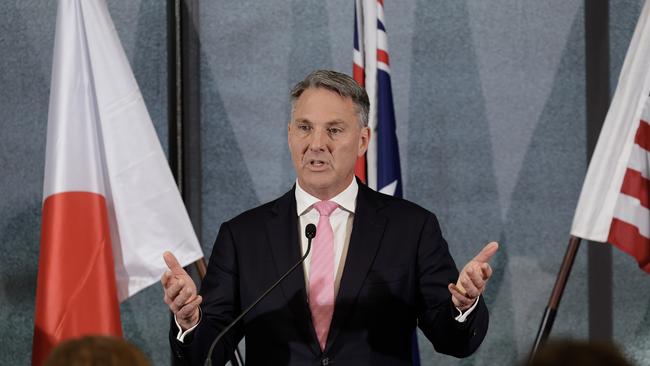Chris Bowen’s rebuffing of Ed Miliband’s UK-US civil nuclear pact reveals Labor’s climate zealotry


The invitation from Australia’s closest allies and AUKUS nuclear-powered submarine partners has also confirmed the ALP’s zealotry and ideologically driven climate change policies.
What’s more, the arguments put forward by Richard Marles and Chris Bowen for rebuffing the invitation to join the UK, US and more than 30 other leading nations were, respectively, unconvincing about the need for Australian expertise in nuclear industry and, frankly, puerile in arguing that even Melbourne is “sunnier” than London.

There’s no doubt UK Energy Minister Ed Miliband dropped the Albanese government into the radioactive waste when he publicly declared Australia was “expected” to join the UK and the US as “allies” in the enhanced civilian nuclear proposal, but the response was, again, ill-prepared, illogical and condescending.
What Miliband did was raise an expectation Australia would go beyond its existing “observer” status on the international forum and force the Energy Minister and Acting Prime Minister into the open to justify refusing to talk about nuclear energy based on policy grounds.
There was also the political context where, within 24 hours of launching a pre-election personal attack on Peter Dutton and the Coalition’s proposed nuclear energy policy, Labor was scrambling to recover from the confusion and contradictions in rejecting the allies’ appeal.
The UK and US set out a perfectly logical and compelling argument for an enhanced climate change policy of speeding up civilian nuclear energy to cut carbon emissions, provide secure, firm power and encourage industry to create jobs and prosperity while decarbonising their processes.

It was an eloquent argument for developing nuclear power that forced the Labor Party to address the policy and the politics.
“Nuclear will play a vital role in our clean-energy future. That is why we are working closely with our allies to unleash the potential of cutting-edge nuclear technology,” Miliband said.
In parliament Marles said Labor would not be signing the agreement because we “don’t have a civilian nuclear industry”. Marles ridiculed the Opposition Leader for wanting to just burn a piece of uranium to make power.

But, as Defence Minister last year announcing the Australian participation in the nuclear-powered submarine program, Marles boasted about 20,000 civilian jobs in South and Western Australia as the government geared up for the submarine project, including training, skills, exchanges with the US and the UK, and university places.
Tens of thousands of jobs depend on the proposed AUKUS nuclear submarine project and yet there is “no civilian nuclear industry” in Australia.
Bowen’s response from Baku was worse politically: a flat-out “no” to the signing and, as if the nuclear ban in Australia is like the Ten Commandments and written in stone, a nuclear industry was “outlawed”.
Bowen then proposed that Australia is much sunnier than the UK and has advantages with solar power that the UK does not and therefore small nuclear reactors were unviable in Australia.

The argument was: Put simply, London has only 1633 hours of sunshine in an average year. By comparison, Australia’s least sunny capital city is Melbourne with 2362 hours, while our sunniest capital city, Perth, has 3229.
Hence, solar panels would answer Australia’s energy needs without recourse to nuclear.
Of course, Great Britain is smaller than Victoria and doesn’t have the transmission challenges of a nation at least 20 times larger and the oil-producing desert state of the United Arab Emirates, which has even more sunshine, has embarked on nuclear power.
Cost of living, particularly the cost of energy, is going to dominate the election campaign, and Labor is going to have to get its story straight on nuclear and Dutton if it hopes to do better than this week.






The Albanese government’s argument for rejecting a UK Labour and US Democratic Party appeal to join a global move to speed up the spread of civilian nuclear energy and cut carbon emissions has left Labor looking contradictory, confused and embarrassed.